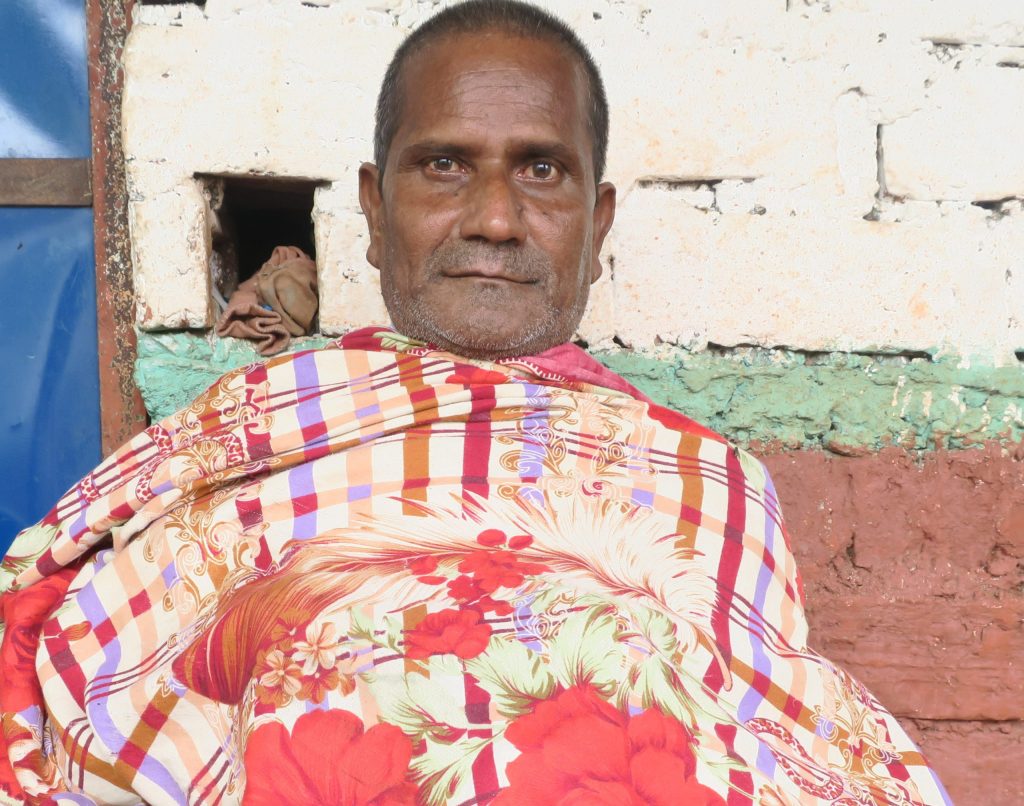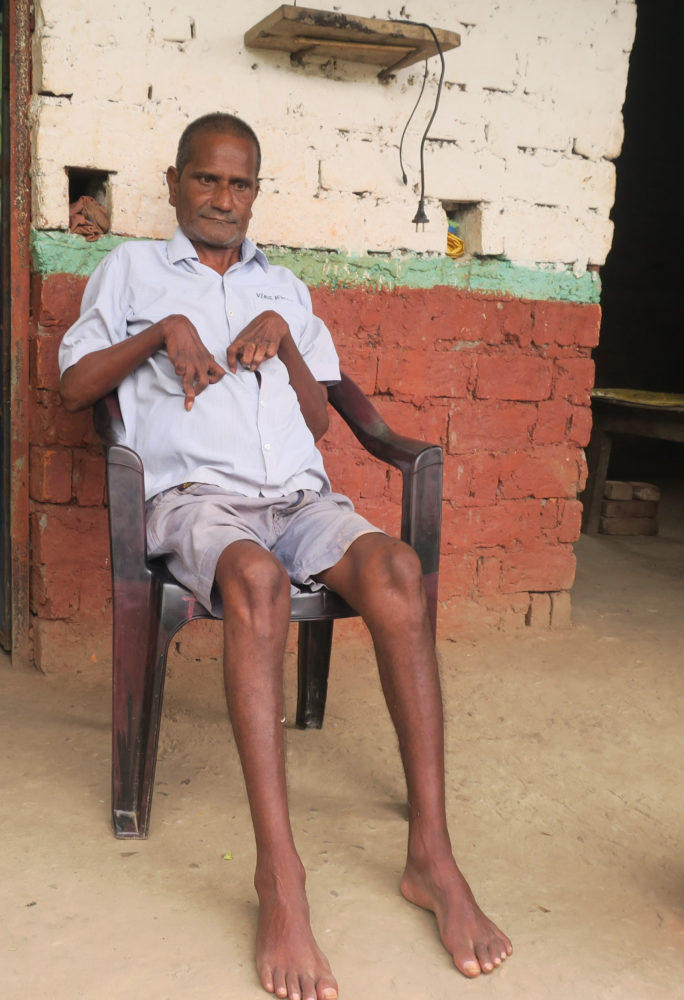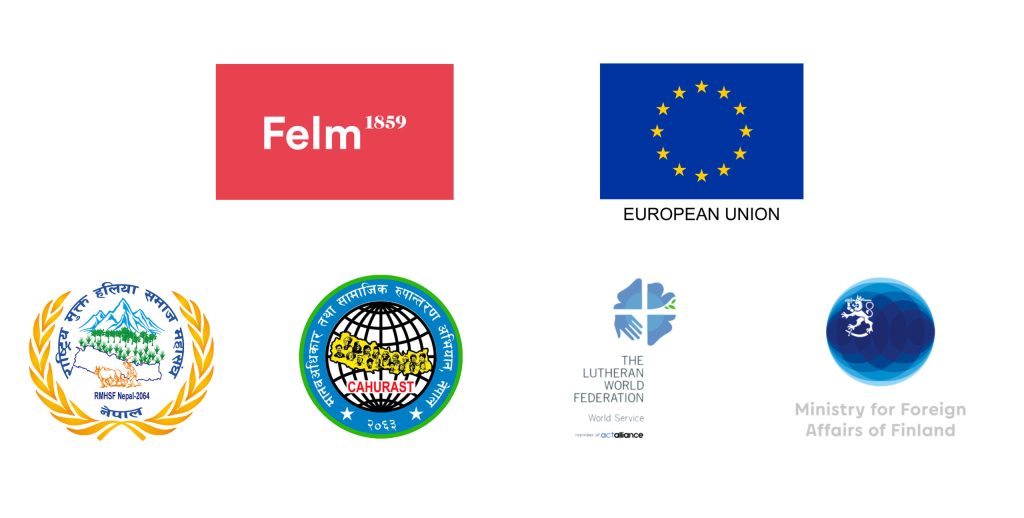In the absence of institutional help and support, Madan Damai needs support from his family members even to stand upright.

(Below in Nepali)
Even for things as basic as sitting upright, Madan Damai, 62, needs support from his family members. Four years ago, on his way home from work, Damai suffered a massive stroke that left the upper part of his body paralyzed. He used to be the breadwinner of the family of four, but now he is jobless and incomeless.
What has made his condition worse is the fact that he has no access to resources such as a wheelchair and information regarding availability of benefits and facilities meant for people with disabilities within Haliyas. Haliyas are former bonded laborers of Western Nepal who had been forced to till other people’s lands with little or no compensation until they were declared free in 2008 by the Government of Nepal. He has not yet been able to get hold of a disability card; neither has he been able to benefit from physiotherapy facilities that are available for people with disabilities at the local level, courtesy of the government or other organizations.
“After I suffered the stroke that made me paralyzed four years ago, I’ve remained very helpless,” Madan Damai, who lives in a Unified Freed Haliya Settlement in Kanchanpur along with 32 families, in the western part of Bhimdutta Municipality, said, as he laid down on the porch of his small house.
“I haven’t gotten any help from anybody as yet to even go to the nearest Ward Office. I hear that help is available, but who’s going to take me there in a vehicle?”
Need to ensure a dignified life for people with disabilities
According to the National Census of 2011, nearly 2 percent of Nepal’s population has some kind of disability. In Kanchanpur district, where Bhimdutta municipality is located, nearly two percent of the population has some kind of disability, with their numbers standing over 9,000, according to National Federation of the Disabled Nepal (NFDN).
Nanda Raj Bhatta is a person with disability in the area, who has been actively advocating for the right of people with disabilities. Although Constitution of Nepal 2015 has upheld rights of people with disabilities in the country, he says, those rights have not translated into action by way of initiatives that should be legally taken by local governments such as municipalities.

“Constitutionally speaking, the achievements are historic. The Act made thereafter is good enough, too. But we have not been able to enjoy free health facilities, or access to information meant for us, or lead a dignified life as provisioned,” he said.
Innovative app to gather information on disability issues
Freed Haliya Empowerment Project (ADHICAR) has currently mobilized community monitors in five districts of Sudurpaschim Province to gather data regarding the economic, social and cultural rights (ESCR) situation of freed Haliyas including Haliyas with disabilities – for which an innovative ESCR mobile app has been developed taking accessibility features available on smartphones into consideration. Also, the app is Unicode-friendly, which is technically suitable also for visually-impaired and people with hearing impairment.
The features in the App has been designed in such a way as to understand the current status and needs of people with disabilities such as access to education, healthcare, and availability of accessible infrastructure. Also, it strives to hold duty-bearers accountable by ensuring that they are knowledgeable about the needs of people with disabilities and that they are fulfilling their duties and responsibilities towards people with disabilities.
In areas of loopholes, the project will work to shed light, hold those responsible accountable and continue to advocate and strengthen their fundamental rights. Once that happens, implementation of inclusive policies will begin to pave the way for necessary and accessible infrastructure in the far-flung districts of western Nepal, benefitting people with disabilities like Madan Damai, who remain helpless as of now.
Written by: Nikita KC, Communications and Visibility Officer, ADHICAR project
This article has been produced with the financial assistance of the European Union. The contents of this text are the sole responsibility of the project partners and can in no way be taken to reflect the views of European Union.
अपांगता भएका हलिया अधिकारको लागि संघर्ष गर्दा दोहोरो भार खेप्दै
संस्थागत साथ–सहयोगको अभावमा अपांगता भएका मदन दमाईँलाई सीधा उठ्न पनि परिवारजनको साथ चाहिन्छ।
सीधा बस्ने जस्तो सामान्य काम गर्नका लागि पनि, ६२ वर्षीय मदन दमाईँलाई आफ्नो परिवारका सदस्यहरूको साथ-सहयोग चाहिन्छ। उनको अवस्था यस्तो छ कि उनले एक्लै शारीरिक हलचल पनि गर्न सक्दैनन् । चार वर्षअघि कामबाट घर फर्किँदै गर्दा दमाईँको शरीरको माथिल्लो भाग पक्षाघात भएको थियो । चारजनाको परिवारको रोजीरोटी जुटाउने उनी अहिले बेरोजगार र आम्दानी विहीन छन्।
ह्वीलचेयर जस्ता स्रोतसाधनमा पहुँच नभएको र हलियामा समुदायमा अपांगता भएका व्यक्ति लाई उपलब्ध गराइने सुविधाको जानकारी नहुँदा उनको अवस्था झनै नाजुक भएको छ । हलियाहरू पश्चिमी नेपालका वञ्चित समुदायका हुन् जो निकै थोरै वा शून्य क्षतिपूर्तिमा बँधुवा श्रमिकको रुपमा अरूको जमिन जोत्न बाध्य पारिएका थिए। त्यस्तै मदनले अहिलेसम्म पनि अपांगता भएको परिचयपत्र पाउन सकेको छैनन्; न त उनले स्थानीय स्तरमा अपांगता भएकाहरूका लागि सरकारी र अन्य संस्थाको सहयोगमा उपलब्ध फिजियोथेरापी (व्यायाम चिकित्सा) जस्ता सुविधा नै पाउन सकेका छन्।
“चार वर्षअघि पक्षघातको झट्का लागेपछि म असाध्यै असहाय भएँ,” भीमदत्त नगरपालिकाको पश्चिम भागमा ३२ परिवारसहित कञ्चनपुरको एकीकृत मुक्त हलिया बस्तीमा आफ्नो घरको दलानमा पल्टिइरहेका मदन दमाईँले भने ।
“मैले अहिलेसम्म नजिकैको वडा कार्यालयसम्म जान पनि कसैको सहयोग पाएको छैन। म सुन्छु कि हामीलाई सहयोग उपलब्ध छ, तर मलाई त्यहाँसम्म गाडीमा कसले लैजान्छ र?”
अपांगता भएका व्यक्तिहरूको सम्मानजनक जीवन सुनिश्चितता आवश्यक
सन् २०११ को राष्ट्रिय जनगणना अनुसार नेपालको करिब २ प्रतिशत जनसंख्यामा कुनै न कुनै प्रकारको अपांगता छ । कञ्चनपुर जिल्लामा पनि कुल जनसङ्ख्याको झण्डै दुई प्रतिशतमा अपांगता भएको पाइएको छ। राष्ट्रिय अपांग महासंघ नेपाल (एनएफडीएन)को तथ्यांकले देखाए अनुसार कञ्चनपुरमा अपांगता भएका मानिसको सङ्ख्या ९,००० हजारभन्दा बढी छ।
नन्दराज भट्ट यस क्षेत्रका एक अपांगता भएका व्यक्ति हुन्। उनले अपांगता भएका व्यक्तिहरूको अधिकारको लागि सक्रिय रूपमा काम गर्दै आएका छन्। नेपालको संविधान २०१५ (विसं २०७२) ले अपांगता भएका व्यक्तिको अधिकार सुरक्षित गरेको भए पनि स्थानीय सरकार/पालिका ले कानुनी रूपमा आवश्यक पहल गर्न नसकेकोले कञ्चनपुरलगायतका जिल्लामा अपांगता भएका मानिस ती अधिकार प्राप्त गर्न बाट अझै वञ्चित रहेको उहाँको भनाइ छ।
“संवैधानिक रूपमा भन्नुपर्दा उपलब्धिहरू ऐतिहासिक छन्। त्यसपछि बनेको ऐन पनि राम्रो छ । तर हामीले नि:शुल्क स्वास्थ्य सुविधाको उपभोग गर्न सकेका छैनौं, न त हाम्रा लागि बनाइएको सूचनामा पहुँच पाउन सकेका छौँ, न त व्यवस्था गरेअनुसारको सम्मानजनक जीवन बिताउन नै सकेका छौं,’ उनले भने ।
अपांगता भएका व्यक्तिका कठिनाइबारे जानकारी सङ्कलन गर्न नयाँ एप
मुक्त हलिया सशक्तीकरण परियोजनाले हाल सुदूरपश्चिम प्रदेशका पाँच जिल्लामा सामुदायिक अनुगमनकर्ताहरूलाई परिचालन गरि अपांगता भएका व्यक्तिका साथै मुक्त हलियाहरूको आर्थिक, सामाजिक र सांस्कृतिक अधिकार (इएससीआर) अवस्थाको तथ्याङ्क सङ्कलन गर्नेछ- जसलाई लिएर एउटा नयाँ ईएससीआर मोबाइल एप विकास गरिएको छ। एपमा स्मार्टफोनहरूमा उपलब्ध पहुँच सुविधाहरूलाई ध्यान दिइएको छ। साथै, एप युनिकोड-मैत्री छ, जुन प्राविधिक रूपमा दृष्टिविहीन र श्रवणशक्ति भएका मानिसहरूका लागि पनि उपयुक्त छ।
शिक्षा, स्वास्थ्य सेवा र अपांगमैत्री पूर्वाधारको उपलब्धता साथै अपांगता भएका व्यक्तिको वर्तमान स्थिति र आवश्यकताहरू बुझ्ने गरी एप डिजाइन गरिएको हो। त्यसले अपांगता भएका व्यक्तिका आवश्यकताहरू बारे जानकारी राख्दछ र अपांगता भएका व्यक्तिप्रतिको कर्तव्य र जिम्मेवारीहरू पूरा गरे-नगरेको सुनिश्चित गरेर कर्तव्यवाहकहरूलाई जवाफदेही बनाउन प्रयास गर्दछ।
कमीकमजोरी भएका क्षेत्रहरूमा, परियोजनाले प्रकाश पार्ने, जिम्मेवारहरूलाई जवाफदेही बनाउने र उनीहरूको मौलिक अधिकारहरूको वकालत र सुदृढीकरण गर्न जारी राख्नेछ। त्यसो भए पछि, अपांगमैत्री नीतिको कार्यान्वयनले पश्चिम नेपालका सुदूर जिल्लाहरूमा आवश्यक पूर्वाधार निर्माणको लागि मार्ग प्रशस्त गर्न थाल्नेछ, जसबाट हालसम्म असहाय रहेका मदन दमाईँजस्ता अपांगता भएका व्यक्तिहरूलाई फाइदा हुनेछ।
लेखक: निकिता के.सी, फेल्म नेपाल
यो लेख तयार पार्न युरोपियन युनियनले आर्थिक सहायता गरेको छ। यस लिखित सामग्रीमा समावेश धारणा पूर्ण रुपमा परियोजना साद्मेदारका हुन् र युरोपियन युनियनले यसको जिम्मेवारी लिदैन।
